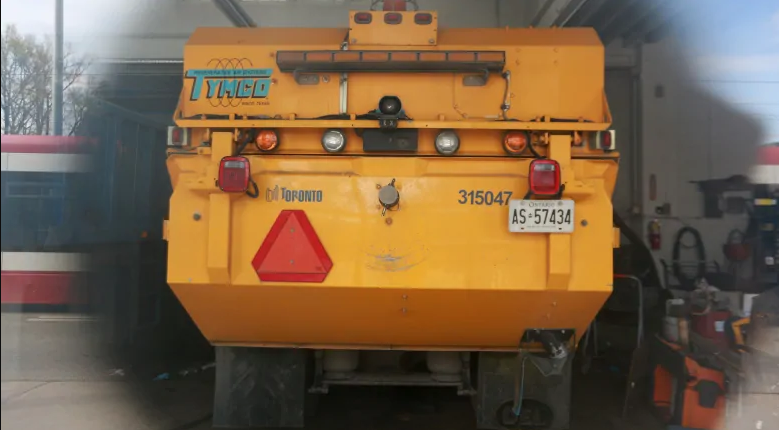City missing cleaning targets on expressways and local roads, with solution a ways off.
The City of Toronto is struggling to clean its expressways and local roads due to ongoing maintenance issues with its fleet of aging street sweepers, leaving residents breathing in dirtier air and more road waste flowing into Lake Ontario.
Transportation staff confirmed that on a typical day just 28 of the city’s 43 sweepers — white trucks equipped with big yellow vacuums that suck up dirt while also filtering the air — fan out across the city. On one April day, nearly a quarter of the city’s entire fleet was in for maintenance.
Worse, this problem is expected to continue throughout the busy summer construction season as replacement vehicles won’t be available until the end of 2019 at the earliest.
The city’s own research, conducted as part of its internationally-lauded Clean Roads to Clean Air program, shows if a fleet of regenerative air sweepers aren’t at work in Toronto, there will be more airborne fine particulate matter hanging around for people to breathe in while more “toxic loads” will wind up fouling the city’s stormwater system.
Heather Marshall, campaigns director with the Toronto Environmental Alliance, said keeping the city’s streets clean is especially important in the spring and summer months, when heavy rain washes pollution into the stormwater system and hot conditions lead to poorer air quality across Toronto.
“It’s really important to be taking that pollution that settles on our streets off the streets entirely,” she said.
“We know here in Toronto we have an air quality challenge,” she said.
Marshall said the city should have been adding more sweepers as construction boomed and more people moved to Toronto, bringing more pollution with them.
But since 2007, when councillors purchased 50 top-of-the-line sweepers and voted to require any new sweeper technology to meet strict environmental standards, the city hasn’t purchased a single new machine.
A new deal was just signed at the end of 2018 to buy 30 new sweepers for some $12.4 million, but most of those vehicles won’t arrive until 2020.
Shortage raises environmental, health concerns
There are plenty of good reasons to keep the streets clear of debris and road dust — a mix of crunched up rock, metal, vehicle exhaust, litter and more.
Clean Roads to Clean Air focused in on finding the best way to remove fine particulate matter from Toronto’s roads. That particulate, referred to as PM 10 and PM 2.5, is considered a toxic substance under the Canadian Environmental Protection Act.
Health research has shown the human respiratory system is negatively affected by the airborne mix of lead, aluminum and aromatic hydrocarbons.
“We have more hospitalizations and premature deaths in our city than we ever should because we’re not dealing with our air pollution,” Marshall said.
That claim is backed up by the city’s own health board, which reported in 2014 that some 1,300 people died prematurely and 3,550 were hospitalized due to air pollution. Recognizing this, the city set targets for cleaning its 5,397 kilometres worth of road.
City staff say sweepers are still meeting cleaning targets on major arterial roads and business improvement areas, but admit there aren’t enough to clean expressways or local roads (the target is to clean local roads once every two months).
This spring, the city was also forced to contract out some of its road-cleaning work for two weeks. CBC Toronto is seeking more information about how much that move is costing taxpayers.
Street sweepers have troubled history
The city’s street sweeper fleet has been hampered with maintenance issues for years, and the woes are well-documented.
Current Auditor General Beverly Romeo-Beehler found this month that from 2015 to 2018 there were lengthy vehicle downtimes due to repairs. One of her most striking findings was that nearly one in three of the city’s heavy duty vehicles — which includes sweepers — was out of service daily in January and February of this year.
Toronto falling behind Hamilton
What’s happening in Toronto hasn’t stopped the City of Hamilton, which was a partner in the Clean Roads to Clean Air testing, from investing in high-end street cleaners.
Hamilton currently has a fleet of 19 DST-6 sweepers, three of which were acquired and put into service in May, officials there confirmed.
Hamilton spends $440,000 per year to maintain its sweeper fleet — or about $25,000 per vehicle. The City of Toronto expects to spend the same to maintain its new vehicles.
CBC Toronto has asked if the city’s auditor general will look into the purchase. In an email response, Romeo-Beehler said she will soon launch the second phase of a review of the fleet services division, which will include: “the purchasing and management of vehicles and other aspects of fleet management.”
Meanwhile, Toronto continues to lack new street sweepers documents show were badly needed in 2015.
Source: https://bit.ly/2L0yIIQ





Recent Comments